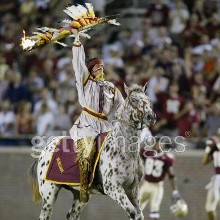 Another Stereotype of the Month entry:
Another Stereotype of the Month entry:
 Another Stereotype of the Month entry:
Another Stereotype of the Month entry:
WWCOD? (What Would Chief Osceola Do?)
By Whit Watson Sun Sports/Fox Sports
Date: Aug 8, 2005
So I'm watching ESPNEWS on Friday night, listening with one ear as an anonymous anchorperson is reading a story about the NCAA banning "hostile or abusive" Native American nicknames from appearing in postseason tournaments. Seeing as how we at Sun Sports devote a great deal of our time and energy to a group called the Seminoles, the story captures my attention.
The anchor concludes his story by revealing that Florida State University president T.K. Wetherell is pursuing legal action against the NCAA, calling this ruling "both outrageous and insulting."
Out of nowhere, I found myself saying the following out loud: "Damn right, T.K."
This was a stunning upset in my house. When asked, I define myself as a social liberal and a fiscal conservative -- like most average Americans, I suppose. Everybody should be free to do whatever the hell they want to do, but I hate paying taxes. You know the drill. My visceral reaction to this story really surprised me. So, in order to judge this fairly, I read up on the story online, making sure that I paid equal attention to every statement from both sides.
Since the NCAA does not conduct a true national championship in Division I football (a topic for another blog), this ruling means nothing to the bowl games that are so important to schools like FSU. In addition to "hostile or abusive" nicknames being removed from uniforms, Native American mascots will be banned from performing at NCAA tournament events, and starting in 2008, the cheerleaders and marching bands will also be compelled to wear uniforms that are free and clear of any and all "hostile and abusive" Native American icons.
The reaction, to quote directly from the Associated Press story: "Vernon Bellecourt, president of the National Coalition on Racism in Sports and Media and a member of the Anishinabe-Ojibwe Nation in Minnesota, approved of the ban but had hoped the NCAA would take even stronger action. 'We're not so happy about the fact that they didn't make the decision to ban the use of Indian team names and mascots,' he said."
I gave the story its due diligence. I listened to both sides. I read the statement from the Seminole Tribe of Oklahoma, which takes a far dimmer view of Florida State's relationship with the Seminole Tribe of Florida. After many deep breaths and careful consideration, calling upon my reservoir of 15-plus years of experience in sports journalism, I came to a thoughtful conclusion: Damn right, President Wetherell.
This is insane. It's not insane to view certain Native American nicknames as offensive -- it's difficult to rationalize names like Savages (SE Oklahoma State), Redmen (Carthage College), or Indians (numerous schools). What's insane is that the NCAA, which is not an official United States government organization in any way, shape, or form, would have the audacity -- the unmitigated gall -- to make decisions on behalf of any other group without express consent or cooperation. According to their own website, the NCAA is "a voluntary organization through which the nation's colleges and universities govern their athletics programs." It is not an arbiter of taste, or ethics, or social justice. It is a body that conducts national sports tournaments. To save time, here is the NCAA's mission statement, again lifted from their own website:
http://www2.ncaa.org/about_ncaa/overview/mission.html

Please note the passage regarding "Respect for institutional autonomy and philosophical differences." Clearly, what we have here is a philosophical difference.
Not only does Florida State University have the complete consent and cooperation of the Seminole Tribe of Florida, the Seminoles themselves have a vested interest in this ruling. Our Sun Sports sources in Tallahassee have explained to me that the Seminole Tribe has remained cooperative in essentially "licensing" the Seminole name over the years because they fear the precedent set otherwise -- if the NCAA can legislate Native American names out of college athletics, the reasoning goes, the next step is the U.S. Government's removal of many of the tax breaks and autonomy currently enjoyed by those same tribes. Plus, we can safely assume that the Seminole Tribe, which pays nearly $3.5 million dollars a year in federal payroll taxes, gets a nice PR bump from seeing their name on the backs of Florida State athletes.
One thing I have learned in those fifteen years -- when in doubt, follow the money. If the Seminoles are not complaining about FSU's use of their name, they must be seeing a tangible benefit. I will admit, however, that I have no idea how the Illini, Chippewa, Utes, or Sioux feel about their names being applied to football teams, nor do I have any information as to how those tribes benefit from the association with college sports.
Point being, the NCAA has missed the point.
For my Seminole bretheren out there, some bad news: the NCAA is free to do whatever it wants to do. If schools like FSU wish to compete in NCAA postseason tournaments, they have to play by the NCAA's rules. It's worth mentioning that Texas Tech basketball coach Bob Knight has attacked the NCAA over the last few days for acting as a "monopoly," a sentiment that might have been viewed as paranoid were it not for the simultaneous news regarding Native American mascots. Fact is, the NCAA IS a monopoly. It is the organization that most accredited colleges and universities bow to in order to participate in lucrative athletic competition. There are no other options, other than the NAIA or complete independence, neither of which will fill luxury boxes at Doak Campbell Stadium. The NCAA is the only game in town, and their governors are free to make judgements on anything. My argument is this: they judged poorly.
In all that I have read and heard on this story, I have yet to hear any compelling evidence that suggests that the Seminoles nickname is in any way "hostile or abusive," at least, according to the Seminole Tribe of Florida itself, which is the only group whose opinion matters in this case. If they are on board, with all due respect, it doesn't matter what the Seminoles of Oklahoma think, nor the NCAA, nor the national media, nor anyone. I'm not against removing offensive Native American nicknames from sports in this country -- but I am dead-set against the NCAA, which knows little or nothing about the long history of Florida State University and the Seminole Tribe of Florida, attempting to legislate morality, particularly when the repressed group in question wants nothing to do with them, and in fact has stated publicly that they're on board.
The NCAA is doing what it believes is right. On that, I give them the benefit of the doubt. But this is insane.
President T.K. Wetherell is scheduled to appear on "Sports Talk Live" on Monday at 7pm on Sun Sports. Assuming that he is able to make his appearance, I plan to give him every opportunity to explain all of this in greater detail. Further, we are making every effort to bring in a guest from the other side of this question, be that someone from the NCAA, the National Coalition on Racism in Sports, or another Native American tribe that takes an opposing stance. I want you all to hear both sides of this issue. But I'll be honest -- it will take an extremely compelling argument to sway me off of my stance, which remains pretty simple:
Damn right, T.K. Let 'em know, brother.
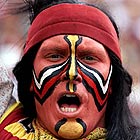
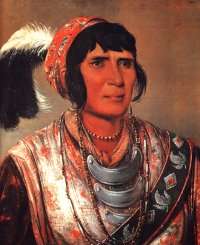
Rob's reply
>> WWCOD? (What Would Chief Osceola Do?) <<
Osceola was a warrior, not a chief. There's your first stereotype.
Since the historical Osceola doggedly resisted the encroachment of white oppressors and subjugators, I doubt he'd enjoy performing before a cheering crowd of them. More likely, he'd lash out and kill someone before submitting to such a degrading spectacle.
>> What's insane is that the NCAA, which is not an official United States government organization in any way, shape, or form, would have the audacity -- the unmitigated gall -- to make decisions on behalf of any other group without express consent or cooperation. <<
See the Canard of the NCAA Knows Best for a response.
Most tribes and Native organizations have taken a position against Indian mascots and demanded their elimination. What do you want, an engraved invitation? That's an expression of their opinion and consent to remove the mascots.
>> According to their own website, the NCAA is "a voluntary organization through which the nation's colleges and universities govern their athletics programs." <<
Right, so schools that don't like its decisions are free to demand changes in the rules or to quit as voluntarily as they joined. What they're not free to do is unilaterally ignore the rules passed by a duly constituted ruling body.
>> It is not an arbiter of taste, or ethics, or social justice. <<
Says who? The whole point of governing is to provide a set of rules that establish the standards for ethical and just behavior. Those who remain in the group are expected to comply with its rules.
If you read the NCAA's mission, you'll see part of it is to foster integrity and sportsmanship. These are nothing but issues of ethics. Any university that joined the NCAA should've known that its actions would come under the NCAA's ethical jurisdiction.
>> Please note the passage regarding "Respect for institutional autonomy and philosophical differences." Clearly, what we have here is a philosophical difference. <<
Let's note all the NCAA's core values, not just the sixth of its seven values:
Core Values
The Association -- through its member institutions, conferences and national office staff -- shares a belief in and commitment to:
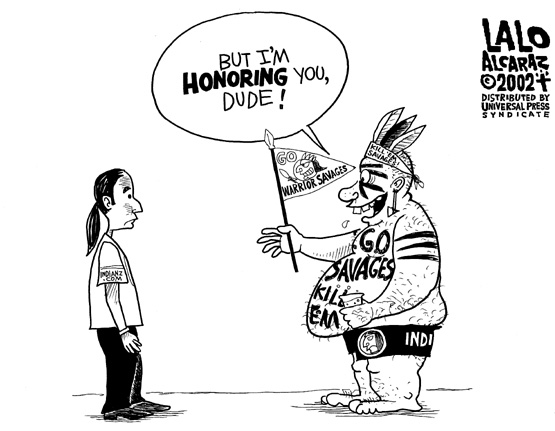
Hmm. The highest level of sportsmanship...which suggests not taunting your opponents with a flaming spear. Supporting the higher education mission...which suggests not exhorting people to stereotype Indians. An inclusive culture that encourages people from diverse backgrounds...which suggests not creating a hostile and abusive environment where Natives are caricatured as warlike savages.
All these values come before the value Watson selectively listed. The ranking suggests that the NCAA puts these values ahead of respect for philosophical differences. In other words, the NCAA respects philosophical differences only to the extent that they don't interfere with the other core values and the overall mission of its members.
In For Dignity's Sake, Stop Using Indians as Sports Mascots (Houston Chronicle, 9/17/05), Tim Giago offers a related argument:
The key letter in NCAA is the "C" for "collegiate." When it comes to sporting activities, it is the responsibility of the National Collegiate Athletic Association to work with and respond to the needs and requests of college students everywhere in America.
This must also include the 36 colleges based upon the sovereign grounds of the Indian nations. Without exception, every Indian-controlled college in this country opposes the use of Indians as mascots.
>> I will admit, however, that I have no idea how the Illini, Chippewa, Utes, or Sioux feel about their names being applied to football teams, nor do I have any information as to how those tribes benefit from the association with college sports. <<
But you're willing to say the NCAA was wrong, even though you have no knowledge whatsoever of 17 of its 18 cases? Talk about unmitigated gall!
>> Point being, the NCAA has missed the point. <<
Which point is that? You already said the NCAA was right in several of its 18 cases (Savages, Redmen, Indians). The only nickname you're defending is the Seminoles. If the NCAA hadn't condemned this one name, you wouldn't have any argument. So what point did the NCAA miss, exactly?
>> In all that I have read and heard on this story, I have yet to hear any compelling evidence that suggests that the Seminoles nickname is in any way "hostile or abusive," <<
See the Canard of Names Can't Hurt You for a response.
>> at least, according to the Seminole Tribe of Florida itself, which is the only group whose opinion matters in this case. If they are on board, with all due respect, it doesn't matter what the Seminoles of Oklahoma think, nor the NCAA, nor the national media, nor anyone. <<
With all due respect, who are you to say the opinion of the Seminoles of Oklahoma doesn't matter? It's their name too, and they're just as stereotyped by the FSU mascot.
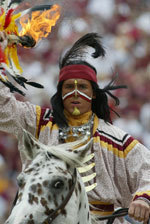
For that matter, who are you to say that all Indians don't have a stake in the stereotyping created by Indian mascots? If someone said, "Florida's black people are lazy," for instance, wouldn't African Americans everywhere be justified in opposing this stereotype? Yes, they would.
Giago, for one, agrees that mascots are a problem concerning every Indian. As he put it:
The powers-that-be at the NCAA must understand that the majority of American Indians rigidly opposed the use of Indians as mascots for America's sporting events. If one or two tribes think it is all right, does that mean they then become the majority? Isn't this a nation where majority rules?
>> I'm not against removing offensive Native American nicknames from sports in this country -- but I am dead-set against the NCAA, which knows little or nothing about the long history of Florida State University and the Seminole Tribe of Florida, attempting to legislate morality <<
I don't know what the NCAA knew about "the long history of Florida State University and the Seminole Tribe of Florida," but after learning about this history, I'd say the NCAA made the right decision. And all governing bodies "legislate morality," so that's an empty argument. What are a group's rules against stealing or cheating except an effort to legislate morality?
The debate continues (8/23/05)....
Days later, Watson wrote about the NCAA decision again. He responded to a thoughtful e-mail from someone who "holds both a Ph.D. and a J.D., and teaches law at a small college in California." Watson continued to complained about the NCAA's "unmitigated gall" in daring to agree with Indians instead of sports fans:
Here's what bothers me the most: according to Ms. Westerhaus, at no time during those four years -- and, as far as I know, at no time in history -- has the NCAA ever directly contacted the tribes or nations in question. In other words, the NCAA's executive committee, made up of no more than 20 school presidents and administrators, has arbitrarily and capriciously handed down a ruling that affects the use of certain indigenous peoples' names -- without ever consulting the people in question.
The NCAA's executive committee — NOT the NCAA itself, a voluntary congress of schools, but a committee — has decided that the terms Sioux, Choctaw, Seminole, Illini, and Ute, among others, are offensive when displayed on athlete's jerseys. However, nobody from the NCAA has ever bothered to ask a living Sioux, Choctaw, Seminole, Illini, or Ute, among others, for their views on the matter.
This, to me, is an egregious misuse of authority, and borderline racist in itself. Paul Kennedy, my co-host on "Sports Talk Live" on Monday night, termed it a "power grab." It's so far beyond the bounds of reason that I struggle to come up with an explanatory analogy. As Max Osceola, a Tribal Council member of the Seminole Tribe of Florida, stated in an interview with the Orlando Sentinel:
"History repeats itself. Once again, non-Indians are telling Indians what's good for them."
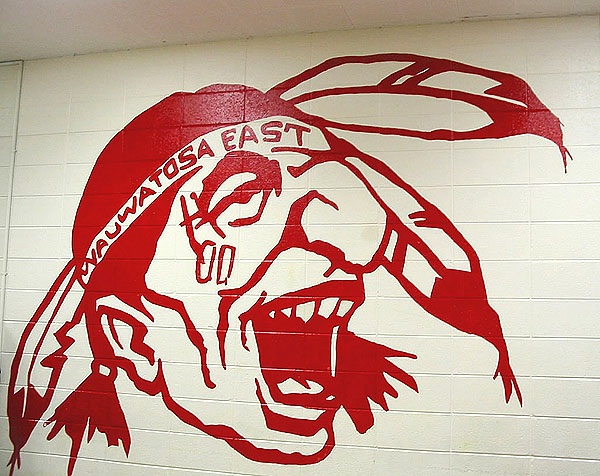
Frankly, I agree that the use of Native American symbology in athletics has serious limitations, but as I attempted to argue in the blog, there is an even more important question to be asked: who the hell is the NCAA's executive committee to speak on behalf of any group, much less Native American tribes, without any due diligence or consultation from the groups in question? Taking the opinions of other Native American tribes is critical, obviously, but not as critical as incorporating the stances of those tribes directly affected by the ban. And as the NCAA's own vice president told us on live television, the executive committee failed to do so. On a broad scale, you're dead right on virtually every point you make. On a practical scale, the only people in America who are truly qualified to make these decisions have been completely excluded from the process. Middle-aged white men in lofty offices have rendered judgment on those they deem unable to defend themselves, and have lessened those "poor souls" in the process. It smacks of a crusade. Truly, history repeats itself. Have we learned nothing?
Rob's reply
Whit,
Re Native American, Continued:
Did you ever receive another response from your correspondent? If not, I'll supply one.
You say the biggest thing that bothered you is that "at no time in history -- has the NCAA ever directly contacted the tribes or nations in question"? This isn't as big an issue as you seem to think it is. Thousands of tribes, Native organizations, and individual Indians are on record as opposing sports mascots. They are the voices of the silent majority.
Why would the NCAA need to contact people when this opposition is well-documented? To verify that everyone who opposes mascots still opposes them? With a limited amount of staff resources, I'd go with the documented record rather than re-surveying the field. I presume that was the NCAA's rationale also.
You say "nobody from the NCAA has ever bothered to ask a living Sioux, Choctaw, Seminole, Illini, or Ute, among others, for their views on the matter"? Again, the positions of living Indians are clear. Let's go down the list and examine the names one by one.
Sioux (Lakota): Many tribes in the Midwest are on record opposing the Fighting Sioux name. The National Congress of American Indians, which includes the Lakota tribes, is on record opposing all mascots. I don't know any tribe or Indian who supports the Fighting Sioux name. Verdict: The NCAA was right.
See Indians Protest, Irish Don't for the evidence against the "Fighting Sioux" name.
Choctaw: I believe the Mississippi Choctaws may support the Choctaw name. As members of the Intertribal Council of the Five Civilized Tribes, the Oklahoma Choctaws are on record opposing all mascots. The National Congress of American Indians, which includes the Choctaw tribes, is on record opposing all mascots. Verdict: Inconclusive at best.
Documentation: The Five Civilized Tribes Intertribal Council Mascot Resolution
Seminole: The Seminole Nation of Florida supports the Seminole name. I believe there are one or two unrecognized Seminole bands in Florida that oppose the name. The Oklahoma Seminoles voted not to oppose the name—i.e., to remain neutral. As members of the Intertribal Council of the Five Civilized Tribes, the Oklahoma Seminoles are on record opposing all mascots. The National Congress of American Indians, which includes the Seminole tribes, is on record opposing all mascots. Verdict: Inconclusive at best.
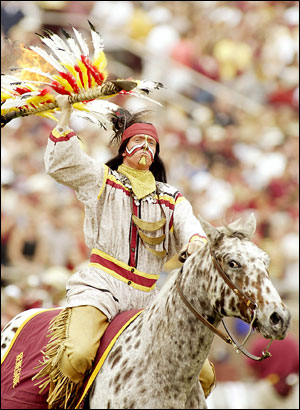
Incidentally, you argued that the opinion of the Florida Seminoles should carry as much weight as the opinion of the Oklahoma Seminoles, even though the latter outnumber the former 3-1. This flies in the face of our democratic ideal, which is one-person, one-vote. You're welcome to your contrary opinion, but the NCAA was following the American standard in giving the most weight to the majority view.
Illini: There are no Illini Indians remaining for the NCAA to query. The Peoria Indians, the Illinis' closing living relatives, are on record opposing the Fighting Illini name. Many tribes in the Midwest are on record opposing the name. The National Congress of American Indians is on record opposing all mascots. I don't know any tribe or Indian who supports the Fighting Illini name. Verdict: The NCAA was right.
Documentation: Request to University of Illinois to Cease Use of Chief Illiniwek as Mascot
Ute: I believe one of the two Ute tribes supports the Ute name. I don't know about the other one. The National Congress of American Indians, which includes the Ute tribes, is on record opposing all mascots. Verdict: Inconclusive at best.
Note that both Ute tribes are located in Colorado, not Utah. There are three recognized tribes in Utah, none of them Utes.
I'm not sure why a Colorado-based tribe should get to say whether the University of Utah's use of the Utes harms Utah's tribes. It's easy to imagine why Utah's tribes might object. The mascot portrays Utah's Indians as fierce or savage warriors, a stereotype the non-Ute tribes might find offensive. Perhaps they were victimized by the Utes in their history and don't want to be associated with them.
Chippewa (one you didn't include): The Saginaw Chippewas of Michican support the Chippewa name. There are several other Chippewa tribes in the northern Midwest who may feel differently. As members of the Great Lakes Inter-Tribal Council, six Chippewa tribes are on record opposing all mascots. The National Congress of American Indians, which includes the Chippewa tribes, is on record opposing all mascots. Verdict: Based on the number of tribes in opposition, the NCAA was more right than wrong.
Documentation: Great Lakes Inter-Tribal Council Inc. resolution
Overall conclusion: True, there are several cases where the NCAA didn't gather enough information to reach a conclusive verdict. But there isn't a single case where the NCAA looked at the evidence in toto and came to a verdict which disregarded said evidence. That includes the much bandied Seminole case.
Moreover, in a few cases (Redmen, Savages, Fighting Sioux, Fighting Illini) the NCAA came to the right conclusion, the one supported by most Indians, but columnists like you have refused to acknowledge it. I wonder how you justify that. If the Seminole ruling is the only one you can fault, how about standing up and saying the NCAA was right in 17 of 18 cases?
For more information on Indian mascots, see Team Names and Mascots.
Rob Schmidt
Publisher
PEACE PARTY
The debate continues (12/15/05)....
Whit,
I'm finally getting to August's mascot debate, so....
>> To your final paragraph, I would like to quickly point out that I have written at least three times in that blog that the use of names like "Redmen" and "Savages" is inappropriate, and in my opinion, those names were inappropriate long before the NCAA decided to address them. <<

I know you did...but you also came down hard on the NCAA for making a decision you agree with, in theory. The effect is to weaken your support for banning names such as "Redmen" and "Savages." Someone reading your blog quickly would've concluded that the NCAA was completely wrong, not that it was right in most cases. That's all they would've remembered because of your vehement denunciation of the decision-making process.
>> Perhaps it is ignorance that has led me to believe that the Sioux should be consulted about the name "Sioux," or that the Seminoles should be consulted about the name Seminoles." <<
The Lakota tribes have been consulted many times in recent years. They've made their position on the "Fighting Sioux" clear. Again, if your core position is to let the tribes decide, where's your column denouncing UND for its nickname? There's no question that the Lakotas as a whole oppose this name.
>> True, the opposition is well documented — but as I wrote in one of my blog entries, who owns the name "Seminole?" Who owns the name "Sioux?" <<
Who owns the name "Redmen" or "Savages," for that matter? No one, in these two cases. Again, it sounds to me like you're waffling. If every Lakota tribe denounces the use of "Sioux," is that sufficient or isn't it?
If no one owns the "Sioux" name, as you seem to be suggesting, then the Lakotas' opposition is irrelevant. Again, is their opposition relevant or not? I say it's relevant. How about you?
>> Are those names the intellectual property of all Native American tribes? <<
Particular names like "Sioux" and "Seminole" aren't. Generic names like "Redskins," "Chiefs," or "Braves" arguably are. And the images of feathered chiefs and warriors, which are the real problem, arguably are also.
>> Does opposition from outside that tribe outweigh support from inside that tribe? How do you make that judgement? <<
For names like "Sioux" or "Seminole," I'd be willing to abide by a vote of every Indian using that name. Would you? Because that would be a novelty. I've yet to hear a single pundit say, "It was wrong for the NCAA to decide without consulting the tribes...but if the tribes say no, the mascots must go."
A vote like this will never happen. It's impossible because it would require coordination among several sovereign tribes. So this is a clever way for pundits to dodge the issue. You say you want a vote...a vote is impossible...so luckily for you, your cherished mascot gets to stay. How convenient.
>> But it is the Seminole Tribe of Florida that has chosen to enter into an agreement with Florida State University. Again, the question — who owns the Seminole name? <<
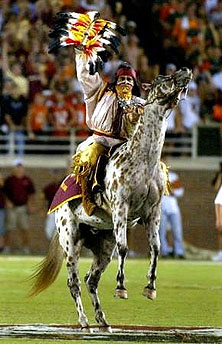
All Seminoles, arguably.
>> Does Oklahoma's greater number outweigh the Florida tribe's right to trade on their name? <<
Yes. And yes, I know that's just my opinion, though it's based on America's democratic standard of one-person, one-vote.
>> By the way, I'm sure you know this, but the Oklahoma Seminoles did not condemn Florida State or their use of the Seminole name <<
Yes, but they didn't approve it either.
>> But Robert, I'll be honest — it's easy to get off-topic when discussing an issue this explosive. <<
Is it? I don't know about you, but I think I'm staying on-topic.
>> My argument, which has developed over many weeks of reading, writing, and following this story, is perhaps best explained in my most recent blog entry. <<
I've been reading and writing about Indian mascots for years, and my views are best explained at Team Names and Mascots.
>> I'm guessing from your note that you read perhaps only one or two of the columns on this topic. <<
Yep...your original column and your "Native American, Continued." Feel free to send me "The Final Word."
>> I'll ask you to read the most recent blog entry before you pass judgement on me <<
I'd say I'm judging your arguments rather than you, but okay.
>> For the record, throughout all of this, I am not at all convinced that any school or university needs a Native American nickname. <<
You don't seem very convinced that any school needs to change its nickname, either.
>> However, it is my position that the NCAA overstepped its bounds in its initial ruling, and has now backtracked, recognizing its own lack of due diligence. <<
I'd say it overstepped its criteria, not its bounds. The NCAA's goal was commendable, as was its investigation, but it failed to give enough credence to the tribal support for "Seminoles," "Chippewas," and "Utes." I'd still say these names have problems—with "Seminoles" being the worst—but the NCAA supposedly was looking for tribal support. By its own criteria, not mine, it had to backtrack in three cases where it slighted the support.
That still means it was right-on in 15 of 18 cases, which is no mean achievement. Way to go, NCAA. Someone has finally honored Indians by actually following their wishes, not the wishes of sports fans and pundits.
If you're curious about "Why FSU's Seminoles Aren't Okay," see my growing examination of the issue at Why FSU's Seminoles Aren't Okay.
>> Again, thank you for your note, and thank you for helping me forward the conversation. <<
You're welcome. If you ever need a comment on a mascot- or Indian-related issue, I'm available. <g>
Rob Schmidt
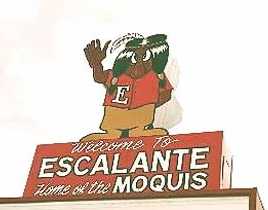
The debate continues (12/23/05)....
Whit,
>> I'd like to know your reaction to the NCAA's decision not to pursue the "Seminole" name issue. <<
If you're interested, my response at Why FSU's Seminoles Aren't Okay is now fairly complete.
>> In my blog, I hoped to convey my belief, based on fifteen years in journalism, that the NCAA had stepped beyond its bounds. <<
Yes, you conveyed that belief. But this seems like two different issues. One, did the NCAA overstep its bounds? Two, should Indian mascots stay or go?
You've made it sound as if they're one issue: The mascots should stay because the NCAA overstepped its bounds. But there's no necessary connection between the issues.
If FSU itself had decided to eliminate Chief Osceola, would you have supported that decision 100%? Somehow, I doubt it. If you're like most sports columnists, you'd be complaining that FSU caved in to "political correctness."
>> Further, I did not receive a satisfactory answer to the question of the Seminole Tribe of Florida's complicity in Florida State University's use of the Seminole name. <<
Between your original correspondent and me, I think we've covered the tribe's role pretty well. Even if the Seminole Indians support FSU, one may consider their support technically valid but morally invalid. As with gaming tribes that debase their sovereignty to open a casino, they may be hurting themselves—and all Indians—in the long run.
Related links
Why FSU's Seminoles aren't okay
|
. . . |

|
All material © copyright its original owners, except where noted.
Original text and pictures © copyright 2007 by Robert Schmidt.
Copyrighted material is posted under the Fair Use provision of the Copyright Act,
which allows copying for nonprofit educational uses including criticism and commentary.
Comments sent to the publisher become the property of Blue Corn Comics
and may be used in other postings without permission.